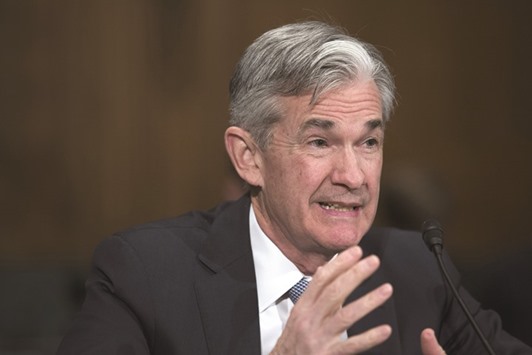A US rate hike may come “fairly soon” if data confirm the economy is continuing to grow and labour markets are still tightening, Federal Reserve Governor Jerome Powell said yesterday in remarks that may help tee up higher rates as soon as mid-June.
Powell said the economy remains on a “solid footing” and that he views ongoing job growth and evidence of rising wages as being more important than recent weakness in consumer spending and business investment.
“There are good reasons to think that underlying growth is stronger than these recent readings suggest,” Powell said in prepared remarks to be delivered at the Peterson Institute for International Economics in Washington.”Labour market data generally provide a better real-time signal of the underlying pace of economic activity.”
“All told, labour market indicators show an economy on a solid footing,” Powell said, adding that the US central bank was on track to meet its full employment and 2% inflation goals.”If incoming data support these expectations, I would see it as appropriate to continue to gradually raise the federal funds rate.”
Powell spoke a day ahead of a scheduled public appearance by Fed Chair Janet Yellen.
Yellen’s remarks today as well as those in a speech in early June will be closely parsed for clues about the Fed’s monetary policy stance going into its June 14-15 policy meeting.
After increasing rates in December for the first time in a decade, the Fed has watched tentatively as global markets seesawed and weak growth in China, Japan and Europe threatened to pull the US recovery off track.
But the Fed now regards those risks as “waning,” and the minutes from its April policy meeting showed several policymakers keying in on a possible June rate increase.
Four Fed regional bank presidents have now urged a rate increase.
That has shifted market expectations that had been discounting higher rates until later in the year, though analysts remain mixed on whether the Fed will move in June or wait until its July meeting.
Complicating the horizon are Britain’s referendum next month on whether to leave the European Union and the US election campaign.
Powell said he thought international risks were on the decline, though he cited the June 23 “Brexit” vote, the refugee crisis in Europe, and economic troubles in China and Brazil as continuing concerns.

Powell says the economy remains on a u201csolid footingu201d and that he views ongoing job growth and evidence of rising wages as being more important than recent weakness in consumer spending and business investment.
